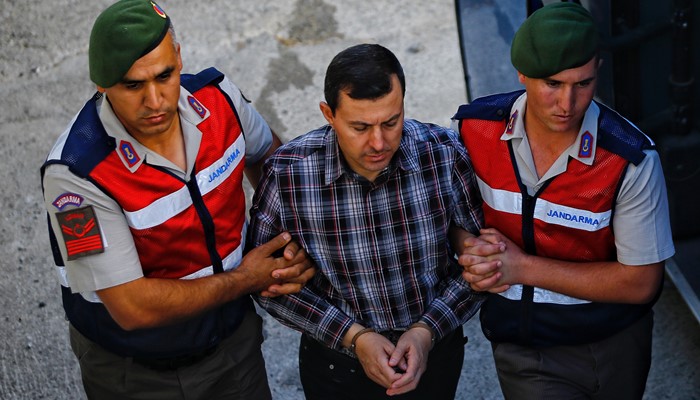The trial of former Turkish Air Force commander Akın Öztürk and other defendants accused of involvement in a failed coup in 2016 took a dramatic turn on Monday, when Turkish President Recep Tayyip Erdoğan’s former chief military aide, Ali Yazıcı, made shocking claims.
The spotlight turned to the 17th High Criminal Court in Ankara, where startling statements were made during the trial of military personnel accused of injuring over 3,000 people during the coup attempt of July 15, 2016.
More than 250 civilians died during the abortive putsch that aimed to overthrow Erdoğan’s Justice and Development Party (AKP) government, which Ankara blamed on members of the faith-based Gülen movement, inspired by the teachings of Muslim preacher Fethullah Gülen.
The 82-year-old Gülen, who lives in the US and was among six defendants tried in absentia, has denied any role in the attempted coup. The files of those defendants were separated from the main trial in 2020.
Despite the strong denial of Gülen and his followers, Ankara removed in excess of 130,000 civil servants from their jobs and imprisoned more than 90,000 people over links to the movement as part of a massive purge launched under the pretext of an anti-coup fight.
Seven years on, police operations targeting suspects accused of links to the self-exiled preacher continue on a regular basis.
Statements of the coup defendants, quoted by journalist Müyesser Yıldız in a column on her personal website, called into question the Turkish government’s long-standing narrative of the coup bid.
Ali Yazıcı, the former chief military aide to President Erdoğan, cast doubt on the official claim that the Gülen movement was behind the coup.
Instead, Yazıcı and others point to a more complex plot involving high-ranking state officials themselves.
Yazıcı, who had served as Erdoğan’s chief aide for a year at the time of the coup, alleged that Hulusi Akar, the-then chief of general staff who later became defense minister and then an AKP lawmaker in 2023, used to refer to Erdoğan behind his back as “the hypocrite.”
Yazıcı did not give further details about this allegation and said people working for Turkey’s spy chief, İbrahim Kalın, were threatening him to remain silent.
What he says would resonate with people familiar with the coup story because some observers, citing first-hand accounts of the coup defendants, say Akar gave all the signals to the generals working under him that he wanted to overthrow Erdoğan.
According to investigative journalists such as Ahmet Dönmez, citing insiders, the July 2016 coup attempt was a false-flag operation ordered by Akar, who masterfully refused to sign official orders while making junior officers do his bidding as the coup leader and washed his hands of the coup when it was foiled after the rogue soldiers were exposed and the rest of the army turned against them.
Former brigadier general Gökhan Şahin Sönmezateş, another key figure in the trial and the only self-proclaimed participant in the coup, previously said during a hearing said it was not the Gülen movement that organized the abortive putsch but rather a “state conspiracy.”
Sönmezateş claimed in July that before the coup trials began, everyone was ordered not to talk about Akar, implying that he played a key role in the organization of the coup bid.
In a heated exchange with the presiding judge on Monday, Sönmezateş asked whether the judges really wanted to know the true orchestrators of the coup, without giving further details.
Sönmezateş led a team that targeted Erdoğan’s hotel on the night of the coup and was sentenced to multiple life sentences.
The former aide Yazıcı claimed Erdoğan’s life would have been in danger if he had not been protected by Yazıcı himself.
In his courtroom testimony, Yazıcı recalled his time with Erdoğan and criticized former military officers who are now allied with the government. He emphasized his personal sacrifices and loyalty to Erdoğan and contrasted them with accusations of conspiracy and betrayal by others.
The defendants and their lawyers pressed for the testimony of key figures such as Akar, alleging their involvement or knowledge of the plot, calling into question the government’s narrative that holds the Gülen movement solely responsible.
A document from the EU intelligence service Intcen revealed by The Times in 2017 concludes that the Gülen movement was not responsible for the coup attempt and that the perpetrators included a broad spectrum of Erdoğan opponents.

